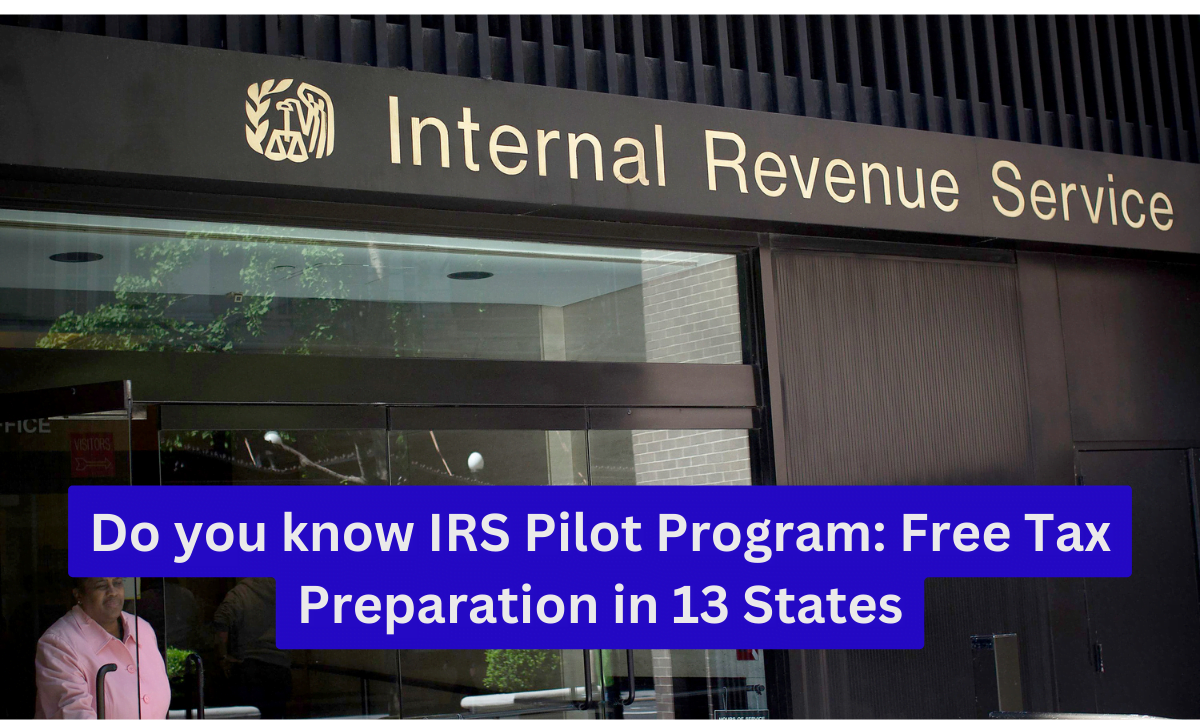The IRS has a new program in 13 states that helps people prepare their taxes for free. This is especially for those with lower or middle incomes who might find it hard to pay for tax help. The program offers free tax preparation software, making it easier for people to understand and do their taxes without having to spend extra money.
The goal is to support people in managing their money better and making sure everyone can do their taxes correctly, even if they can’t afford professional help. This program is part of a larger effort to include more people in financial activities and give them the tools they need. As tax season approaches, those who qualify in the 13 states can use this program to make the process of preparing their taxes a bit easier.
Understanding the IRS Pilot Program
The Internal Revenue Service (IRS) is set to roll out a pilot program, Do you know IRS Pilot Program: Free Tax Preparation in 13 States that offers free tax preparation services to eligible taxpayers in 13 states. This program aims to simplify tax filing for those with relatively straightforward returns, potentially saving taxpayers time and money. In this blog post, we’ll delve into the details of the program, its objectives, eligibility criteria, and the reactions it has garnered.
What is the IRS Pilot Program About?
The IRS pilot program seeks to test the feasibility of providing free tax preparation services directly through the agency itself. This initiative is a response to the rising costs and complexities associated with filing taxes using paid options like tax software or hiring an accountant. In the past tax season, individuals and businesses spent an average of $250 and 13 hours on their tax preparation.
Eligibility and Invitation
To participate in the IRS pilot program, eligible taxpayers must have relatively simple tax returns. They will also need an invitation from the IRS to take part. The program is primarily designed to cater to individuals with income from W-2 wages, Social Security, jobless benefits, and interest income under $1,500.
Supported Credits and Deductions
The IRS platform can handle various tax credits, including the Earned Income Tax Credit and the Child Tax Credit, as well as commonly used deductions like the standard deduction, student loan interest deduction, and educator expense deduction.
Participating States
The program will be open to taxpayers in nine states without state-level income tax: Alaska, Florida, New Hampshire, Nevada, South Dakota, Tennessee, Texas, Wyoming, and Washington. It will also be available to certain taxpayers in four states with their own income taxes: Arizona, California, Massachusetts, and New York.
The Controversy
The prospect of the IRS offering free tax preparation services has garnered mixed reactions. While consumer advocates view it as a significant step to counter high-cost tax preparation companies, some critics argue that it may not serve taxpayers effectively. Companies like H&R Block and Intuit, the owner of TurboTax, have expressed concerns about potential financial implications and competition with existing services.
The IRS’s Approach
The IRS plans to roll out the pilot program slowly to evaluate its effectiveness and make necessary adjustments. The agency anticipates that several hundred thousand taxpayers will choose to participate in the free program, providing valuable insights into its viability.
The Future of Tax Preparation
The pilot program is seen as an alternative to the existing Free File program, which has been underutilized by eligible taxpayers. While some argue that it’s a step in the right direction to empower taxpayers, others maintain that the IRS should focus on improving its existing services.
FAQs About the IRS Pilot Program
Q1: Who is eligible for the IRS pilot program?
A1: Eligible taxpayers with relatively simple tax returns, primarily those with income from W-2 wages, Social Security, jobless benefits, and interest income under $1,500.
Q2: In which states is the IRS pilot program available?
A2: The program is available in nine states without state-level income tax and four states with their own income taxes. These include Alaska, Florida, New Hampshire, Nevada, South Dakota, Tennessee, Texas, Wyoming, Washington, Arizona, California, Massachusetts, and New York.
Q3: How can I participate in the pilot program?
A3: To participate, you’ll need an invitation from the IRS, which will be extended to eligible taxpayers.
Q4: What types of credits and deductions can the IRS platform handle?
A4: The platform can handle various credits, including the Earned Income Tax Credit and the Child Tax Credit, as well as deductions like the standard deduction, student loan interest deduction, and educator expense deduction.
Q5: What are the goals of the IRS pilot program?
A5: The program aims to test the feasibility of the IRS providing free tax preparation services directly to taxpayers, potentially saving them time and money.
Q6: What are the reactions to the IRS pilot program?
A6: The program has received mixed reactions, with some praising it as a way to counter high-cost tax preparation companies and others expressing concerns about its impact on existing services and potential financial implications.
Q7: How will the IRS pilot program be rolled out?
A7: The IRS plans to introduce the program gradually, evaluating its effectiveness and making necessary adjustments based on user feedback and participation.
In conclusion
the IRS pilot program represents a significant step towards simplifying tax filing for eligible taxpayers in 13 states. While it has generated both support and criticism, its success will be determined by its ability to provide a viable, user-friendly, and cost-effective alternative to traditional tax preparation methods.

1 thought on “Do you know IRS Pilot Program: Free Tax Preparation in 13 States”